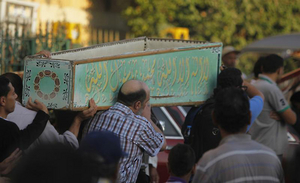The United Nations Human Rights Watch accused on Thursday the Muslim Brotherhood in Egypt of using hate speech for months and provoking the public opinion in the country against the Muslim Shiites.
 The United Nations Human Rights Watch accused on Thursday the Muslim Brotherhood in Egypt of using hate speech for months and provoking the public opinion in the country against the Muslim Shiites.
The United Nations Human Rights Watch accused on Thursday the Muslim Brotherhood in Egypt of using hate speech for months and provoking the public opinion in the country against the Muslim Shiites.
“The lynching of four Shiites by a mob apparently led by Salafist sheikhs in the village of Abu Musallim in Greater Cairo on June 23, 2013, came after months of anti-Shia hate speech at times involving the ruling Muslim Brotherhood and its political party,” HRW said.
“The episode shows that the government needs to recognize that Shiites in Egypt are at risk and to take protective measure to ensure their protection and equal rights.”
The watchdog also tackled the security forces who were present in the area and “failed over a period of three hours to intervene to halt the mob attack on a house where a group of Shiites had gathered for a religious feast,” calling for a serious investigation in the matter that “should address the role played by Salafist sheikhs against Shiite families in Abu Musallim.”
“Mursi should state unequivocally that Shiites in Egypt have the right to practice their religious beliefs without fear and intimidation, something he has failed to do,” Human Rights Watch added.
“The brutal sectarian lynching of four Shiites comes after two years of hate speech against the minority religious group, which the Muslim Brotherhood condoned and at times participated in,” said Joe Stork, deputy Middle East director at Human Rights Watch.
“This horrific incident in Abu Musallim shows that Shiites can’t even gather in the privacy of their homes to celebrate and heightens fear of persecution among all religious minorities in Egypt.”
The humanitarian organization further indicated that the anti-Shiite hate speech by Salafists and the Muslim Brotherhood has been going on for two years.
Human Rights Watch visited the village of Abu Musallim in the governorate of Giza and spoke to three witnesses, including one man who was in the house when it was attacked.
Their accounts were supported by video footage of the events on June 23, when 24 Shiite residents gathered in the home of Arafat Ali Omar to celebrate a religious feast, the birth of the Imam Mohammad ibn Hassan al-Mahdi (as), the twelfth and last imam of Shiite Islam. Police later said that on the previous Friday sheikhs from local mosques called for the Shiites to be removed from the village.
Some time after 3 p.m., a crowd of over 1,000 people gathered and two Salafist sheikhs were seen making phone calls and apparently directing people. The crowd began hurling stones and Molotov cocktails into the house.
Four of the men inside, including Sheikh Hasan Shahata, left the house during the attack to protect those who remained inside, including women and children.
The crowd attacked, beat, stabbed and lynched the four men. Video footage shows their bloodied lifeless bodies being kicked on the ground and then dragged through the streets.